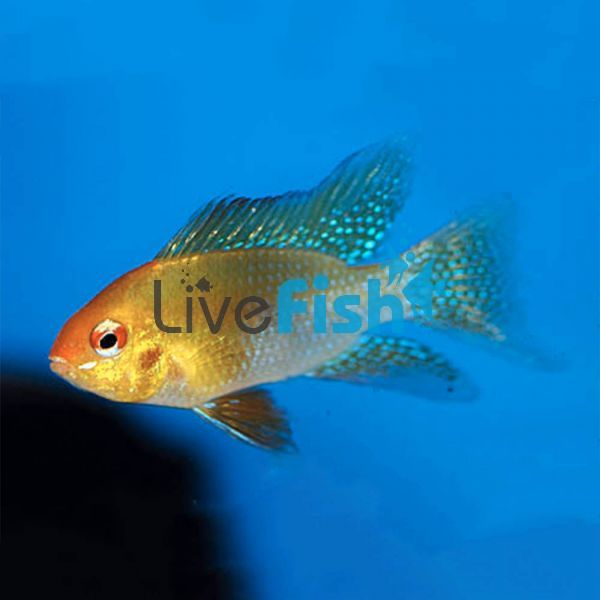Ramirezi Golden 4.5cm
Yet another beautiful variation of the already phenomenal blue ram, these striking golden fish have quickly become one of the world's most popular dwarf cichlids. Through the years of selective breeding, the wild colour blue ram has been developed to create this phenomenal gold ram which is a striking sunburst yellow base colour that slowly fades to a cream colour. They also carry the mesmerizing blue speckling through the fins seen in the common blue ram which makes this fish the best of both worlds.
Gold Ram
Yet another beautiful variation of the already phenomenal blue ram, these striking golden fish have quickly become one of the world's most popular dwarf cichlids. Through the years of selective breeding, the wild colour blue ram has been developed to create this phenomenal gold ram which is a striking sunburst yellow base colour that slowly fades to a cream colour. They also carry the mesmerizing blue speckling through the fins seen in the common blue ram which makes this fish the best of both worlds.
A cherry on top, their whole gold colour is starkly contrasted by their blood-red eye which is not just exclusive to the gold ram but a shared feature amongst the other colour variations as well. Along with their colour they have a bold personality and are the perfect size for those keeping smaller aquariums. Gold rams are a tropical species however their temperature requirements are slightly higher at around 28 - 30 degrees when compared to other tropical fish. Because of these higher temperature requirements and the already sensitive nature of rams they are often kept with the highly coveted discus.
Gold rams are regarded as a community fish as they are peaceful and remain fairly small at 7cm max. They are also bred fairly easily in captivity and differentiating males and females are possible where the male's body is more elongated than that of a female, the male's dorsal fin ends in more of a point. However, the best method to identify is to get a pack of 4-6 rams and let them naturally pair off.
Tank Recommendations for your Gold Rams
Being a dwarf cichlid, gold rams can be kept in smaller aquariums however the minimum would be around 60 liters (20 gallons). As always though a larger aquarium would be far better and making sure there is a decent floor space can avoid any territorial behavior that gold rams may exhibit. They will also prefer a well-planted aquarium and hiding places like caves. Sand or small grain gravel substrate would be fine for these fish as they do routinely sift through the sand for food and make breeding pits in the substrate as well. Gold rams would be kept with others of their kind to make them feel comfortable and be more active in the aquarium, this may also even reduce aggression they could show to other fish. They are also soft water fish meaning they require a low PH. They can be kept in PH as low as 6.
Suitable Tank Buddies
The gold ram is a fairly peaceful fish that only may display aggression in territorial disputes however can be kept with a wide range of community fish.
Usually Compatible
Discus, Angelfish, cardinal tetras, Corydoras, and other rams
Sometimes Compatible
Larger peaceful South American cichlids such as Uaru, Severums, and other fish may out-compete them as they are mostly bottom-dwelling fish. They may also eat extremely nano fish such as endless.
Rarely Compatible
Large and aggressive species such as Oscars which may prey on the gold rams
Feeding your Gold Rams
Gold rams are very easy to feed. They will take a wide range of pellets, flakes, and frozen foods. Just like any fish though they should be fed a varied diet with a mix of different foods. The ideal diet would be a good quality micro slow sinking pellet or crushed flake, supplemented with frozen bloodworms or black worms or even live foods like baby brine shrimp or micro worms.
| Scientific Name | Mikrogeophagus ramirezi |
|---|---|
| Care Level | Moderate |
| Common Names | Gold ram, Mikrogeophagus Ramirezi var. Gold, German Gold Ram. |
| Diet | Carnivore |
| Fish Family | Cichlidae |
| Lifespan (years) | 4 |
| Max. Length (cm) | 7 |
| Min. Tank Volume (l) | 60 Liters |
| Origin | South America |
| Reef Safe | Yes |
| Sociability | Peaceful |
| Venomous | Yes |
| Water Conditions | 26°-30° C (82-86° F), pH 6.0-7.0 |




